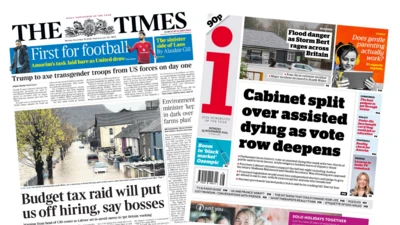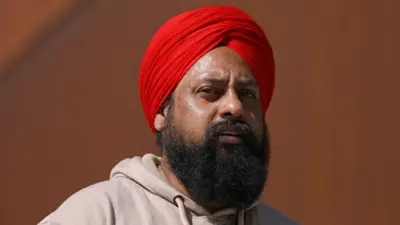We've updated our Privacy and Cookies Policy
We've made some important changes to our Privacy and Cookies Policy and we want you to know what this means for you and your data.
Poor bright boys underachieving at GCSE, says charity
Image source, PA
- Author, Abigail Simmons
- Role, Education reporter
Bright boys from poorer backgrounds in England "seriously underachieve" at GCSE, according to research from the Sutton Trust education charity.
After comparing test results at primary school with how children perform at GCSE, researchers say more than a third of poorer boys underperform.
The Sutton Trust says too many schools "lack the support" for these students.
The government says the attainment gap between rich and poor children is narrowing.
'Missing talent'
Researchers looked at results from 7,000 children who performed highly in their Sats tests at the end of primary school, but did not go on to achieve GCSE results in the top 25% of pupils.
The report acknowledges that "progress through school is not always smooth and predictable" and there are children who fall behind at secondary school.
But they identify some children as "missing talent", including bright boys from poor or disadvantaged backgrounds.
Boys, the researchers say, are almost twice as likely as girls to "fall off track" and being from a poor background more than doubles that risk.
Their research concludes that 36% of "highly able" boys who are eligible for the pupil premium fail to achieve a "good set of GCSEs".
Subject choice and location
The report authors say that a bright but disadvantaged child is less likely to take GCSE subjects that will lead to a place at a good university.
Almost a quarter will not take a language at GCSE and are less likely to take history or geography.
Only 53% of these children will take triple sciences - separate papers in physics, chemistry and biology - compared with 69% of their better-off classmates. This may be through choice say the researchers, or simply because they are in a school that does not offer triple science.
Where pupils live will also affect their achievement, say the researchers.
"Schools in many areas of the country make consistently good provision for highly able pupils so that almost all achieve good GCSE results."
But, they warn, eight out of 10 of the worst-performing local authorities are in the north of England or the Midlands.
Dr Lee Elliot Major, chief executive of the Sutton Trust, said the figures highlighted the "tragic waste of talent" in schools.
"It is a scandal that over a third of boys from low income backgrounds who achieve so highly at the end of primary school are not among the highest school achievers at age 16," he said.
The Sutton Trust is calling for a new "highly able" fund to support disadvantaged bright children.
A spokesman for the Department for Education said: "We are determined to ensure every child, regardless of background is given an education which allows them to realise their potential.
"That is why our reforms place high expectations at the heart of our school system, with a rigorous new curriculum, world-class exams and a new accountability system which rewards those schools that push every child to achieve their best."
Top Stories
More to explore
Most read
Content is not available








